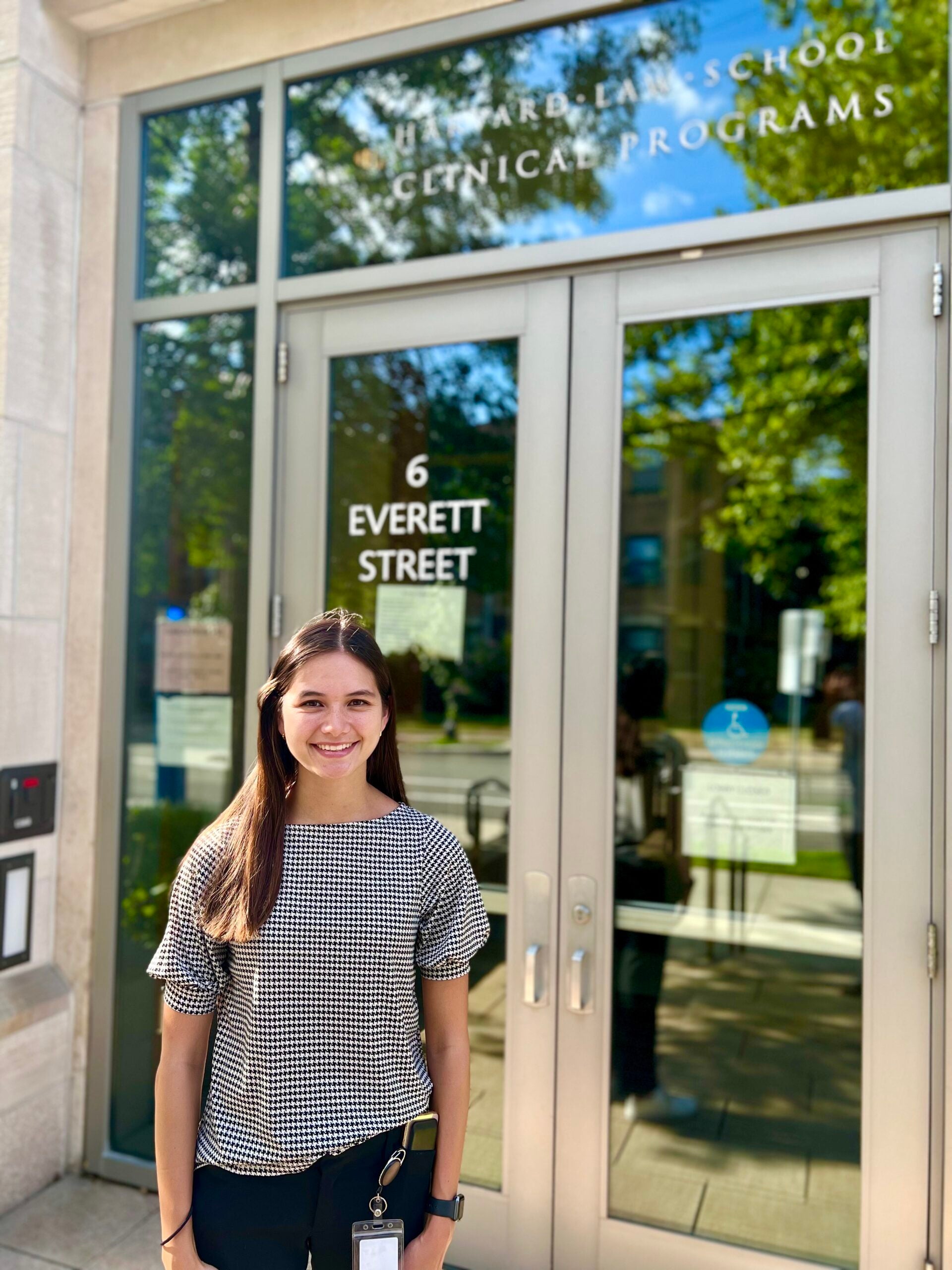By Annalise Wagner ’23

This past spring, I worked as a Student Attorney in the WilmerHale Legal Services Center Housing Clinic. From the first day of training, Clinical Instructors Maureen McDonagh and Julia Devanthéry are quick to tell students “I might be your supervisor, but you are the attorney.” Throughout the semester, I commuted to the Legal Services Center Office in Jamacia Plain, where I worked with clients, defending them in court, helping them write motions, and connecting them with much needed resources to help stabilize their housing. The Housing Clinic focuses on representing tenants with low incomes facing eviction, working to prevent homelessness.
Students in the Housing Law Clinic are quickly familiarized with the summary process statute: the Massachusetts law that sets out what landlords must do when they attempt to evict tenants. While the statute is intentionally designed to make the eviction process efficient for landlords, it also provides many important protections to tenants, such as the right to raise defenses and counterclaims, and the right to a jury trial. These protections often make the difference between whether our clients are able to remain in their home, or whether they will experience homelessness.

Image Credit: Wikimedia Commons
Recently, the Appeals Court of Massachusetts considered the question of who is entitled to those protections in Slavin v. Lewis. In Slavin, a plaintiff sought to remove a long-time occupant (his former romantic partner) through a preliminary injunction in a trespass action rather than using normal eviction procedures. The Plaintiff asked the court to allow him to circumvent the typical eviction process because his former partner had never established a formal tenancy, despite living in the home with the Plaintiff for almost a decade. He maintained that she was a mere licensee without access to basic due process protections, and that he therefore had the right to remove her from her home immediately.
Right away, this case caught the eye of many tenant and domestic violence advocates across the state. Allowing landlords to force long-time occupants to move out simply because their name does not appear on a lease would impact a group already at a high risk of experiencing homelessness: survivors of domestic violence. Because of economic and other types of abuse, survivors are frequently left off of leases and their housing status is often precarious. If abusers had access to evictions by injunction, they would have an additional and incredibly harmful tool with which to carry out continued abuse and push their partners into homelessness. The parties’ briefs did not call these implications to the attention of the court. Therefore, it was important for the Housing Law Clinic and the Housing Justice for Survivors Project to join an amicus brief to make sure the court knew the full scope of the issues before it.
The Housing Law Clinic collaborated with a broad coalition of legal aid attorneys who represent tenants and survivors of domestic violence, including attorneys and law students from the Harvard Legal Aid Bureau, the Massachusetts Law Reform Institute, Greater Boston Legal Services, and the South Coastal Counties Legal Services, Inc. As a clinical student, it was particularly exciting to attend the coalition’s planning meetings, and to hear the contributions of attorneys with backgrounds in family law, housing law, and appellate litigation, among other areas. And it was clear that the groups involved had strong relationships built over years of collaboration. The diverse backgrounds of advocates made for two very strong, complimentary amicus briefs.
The brief that I worked on under the supervision of Julia Devanthéry, along with fellow LSC Housing Clinic students Hannah Hubbard ’22 and Alex Ramsey ‘22, focused on the how the case would impact survivors of abuse. We highlighted empirical data, personal narratives, and legal analysis that emphasized the importance of due process for survivors facing eviction. Researching, writing, and finalizing the brief was a collaborative process at every stage—Hannah, Alex, and I met with Julia and with the broader coalition regularly to share ideas, drafts, and feedback. At the end of a semester spent working on individual cases, it was very interesting to zoom out and reflect on aspects of the housing system as a whole.
Harvard Legal Aid Bureau students Jazmine Phillips-Acie ’23 and Sara Tsai ‘23 also worked with Esme Caramello to submit an amicus brief focusing on housing law arguments against eviction-by-injunction. HLAB’s brief powerfully argued that summary process is the exclusive remedy for plaintiffs like Slavin. Ultimately, the Appeals Court agreed with amici and held—albeit in a narrow ruling—that the Plaintiff in Slavin v. Lewis was required to go through the typical summary process procedure in order to seek permission to remove the defendant from her home. See Slavin v. Lewis, 2022 WL 2163805 (2022) (Unpublished Disposition).
Appellate advocacy and jurisprudence can, at times, feel somewhat abstract and separated from the individuals it impacts. And in Harvard Law School classrooms, it is easy to get caught up in procedural and doctrinal niceties and forget that the legal profession impacts individuals’ lives in distinct and tangible ways. Legal interpretation regularly inflicts irreversible pain and suffering on marginalized litigants. Everyone involved in the legal system should be should cognizant of this reality. The amicus brief we wrote was an important way to remind the judges in this case of the unique power they wield, and to urge them to consider how their decision would create shockwaves of harm affecting the most vulnerable populations. I was inspired to see so many advocates come together to contribute to this important work, and it was an honor to have played a small part in the case’s favorable outcome.
Filed in: Clinical Spotlight, Clinical Student Voices
Tags: Class of 2023, Harvard Legal Aid Bureau, Housing Law Clinic
Contact Office of Clinical and Pro Bono Programs
Website:
hls.harvard.edu/clinics
Email:
clinical@law.harvard.edu